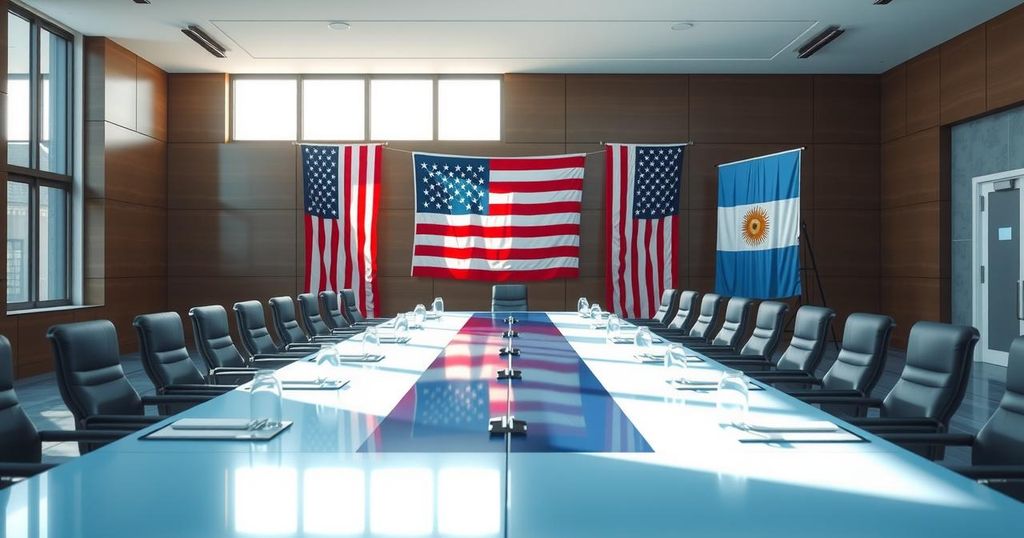Global news
ARGENTINA, CASA ROSADA, CUBA, DIANA MONDINO, DIPLOMACY, DIPLOMATIC RELATIONS, FOREIGN MINISTRY, GERARD, HAVANA, HUMAN RIGHTS COUNCIL, MARCO RUBIO, MILEI, NORTH AMERICA, RUBIO, SOUTH AMERICA, STATE DEPARTMENT, TRADE RELATIONS, UN, UNITED STATES, WASHINGTON, WESTERN HEMISPHERE
Fatima Khan
0 Comments
U.S. and Argentina Unite Against Authoritarianism in Cuba
The U.S. and Argentina have reaffirmed their commitment to combat authoritarianism, particularly in Cuba, Nicaragua, and Venezuela. After discussions between their foreign leaders, they pledged ongoing support for the people of these nations and reinforced diplomatic ties based on shared values. President Javier Milei has notably taken a strong stance against Cuba, reflecting a shift in Argentina’s foreign policy.
The United States and Argentina convened to reaffirm their commitment to tackle authoritarianism in the region, focusing on the regimes in Cuba, Nicaragua, and Venezuela. This joint effort was highlighted following a meeting between U.S. Secretary of State Marco Rubio and Argentine Foreign Minister Gerardo Werthein, who stressed the importance of countering regimes that threaten U.S. national security and regional stability.
In a statement released by State Department spokesperson Tammy Bruce, both leaders expressed their support for the oppressed citizens of Cuba, Nicaragua, and Venezuela who are fighting for their fundamental freedoms against authoritarian oppression and external malign influences. Furthermore, Secretary Rubio acknowledged Argentina’s cooperation on economic issues and advocated for enhanced collaboration in strategic sectors.
Additionally, the statement underscored mutual interests in strengthening the diplomatic relations between the United States and Argentina, grounded in shared values and objectives. Cuba’s designation as a primary concern occurs in a climate of rising international condemnation towards its government’s severe human rights violations and suppression of dissent.
Argentine President Javier Milei made headlines following his speech at the UN General Assembly in September 2024, where he labeled Cuba, Venezuela, and Iran as “bloody dictatorships.” He criticized their participation in the Human Rights Council, raising concerns about their legitimacy in defending fundamental freedoms. This marked a shift from Argentina’s previous diplomatic approach and prompted varied reactions domestically and internationally.
In November 2024, President Milei expelled diplomats from the Foreign Ministry who had supported a UN vote aimed at lifting the U.S. embargo against Cuba, calling them “traitors to the homeland.” This decision resulted in a reshuffle of the diplomatic team and reinforced Argentina’s alignment with the U.S. and Israel concerning Cuba.
In March 2025, Cuban leader Miguel Díaz-Canel voiced support for protests in Argentina against Milei’s reforms, stating, “we all have to go out” to defend just causes. However, this stance was criticized due to its contradiction to the Cuban government’s own oppressive measures against internal dissent. Observers noted the double standard in the Cuban regime’s approach to freedom of expression and citizens’ rights as this issue garnered attention across social media and independent outlets.
The objective of the U.S.-Argentina dialogue primarily focuses on combating authoritarianism in Cuba and other nations deemed a threat to regional security. Cuba’s situation is particularly concerning due to ongoing accusations of human rights violations and suppression of dissent, which pose risks to both nations’ interests.
Under President Trump’s administration, U.S. policy towards Cuba adopted a more stringent and punitive approach, reinstating measures like Title III of the Helms-Burton Act. Argentina’s current administration under Javier Milei reflects a critical perspective on the Cuban regime, denouncing human rights abuses and refraining from appointing ambassadors to Cuba, thus actively participating in international discussions against authoritarianism.
The discussions between the United States and Argentina signify a strengthened partnership aimed at addressing authoritarianism in the region, particularly in Cuba, Nicaragua, and Venezuela. This collaboration reflects a commitment to supporting individuals fighting for freedoms in these nations, aligning diplomatic strategies, and fortifying bilateral relations based on mutual values. Both countries remain focused on the implications of Cuba’s regime as a significant concern for regional stability and human rights.
Original Source: en.cibercuba.com




Post Comment